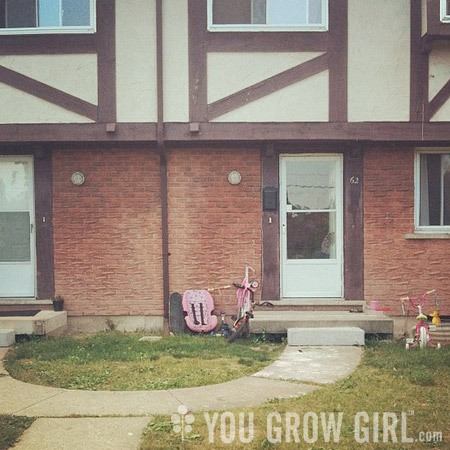
One of the garden projects I’ve had on tap to post about is the woven willow bean tripod I built last week, shortly after our return from a road trip that took us through my “hometown” and the place where I grew up. This sort of garden work is creative, but it is also physical, and I find that while my hands and body take over, my mind is freed to wander and meander over thoughts and emotions that have been stuck in my subconscious.
Meditation in motion.
All-in-all the bean support probably took about 2 hours to construct from start to finish and I spent the entire time mulling over the stark contrast between the lifelessness of that place and where I live now. I thought about the reasons why people can end up in a place like that without the resources or agency to turn it around. When I think about my childhood in that townhouse complex, class inevitably sticks out and I do not want to undermine that. Class Matters. To be clear, I am not speaking of or for the people who live there now, I am only speaking of the experiences I had while living there. What struck me when I stood at the edge of that walkway to the front door of #62 was that the impoverishment I experienced there wasn’t simply about a lack of money. It was not about a lack of things, which is what my mother often jumps to in her defence. Which is what people think of first when they think of impoverishment. We had shoes on our feet, cable television, and toys. We did not die. This is what she says. That my childhood was a success because I lived through it. No, it was so much more than that. The physical deadness of the place where even the few hardscrabble plants I remembered as a child were now completely wiped away served as a visual reminder of other kinds of deadness. The kinds that are sometimes hard to define and certainly less tangible than a lack of greenery or our very mortality.
This inevitably lead me to thoughts about making something out of nothing, which is what I was doing at the time. Here was a pile of branches clipped from a friend’s garden; yard waste that I was turning into an artful supportive structure. And here was a handful of bean seeds gifted from another gardening friend that in a few months time will grow into a beautiful, edible plant that we will be nourished by, which will also provide seeds for next year’s garden. And so on.
As I finished the structure and planted the seeds I felt proud and satisfied. I imagined the way it will look once the green leaves have formed and wrapped themselves around the brown branches. And the bright scarlet flowers that will follow them. Alive and colorful. A simple idea, come by simply. And yet to have this simple beauty in my life is not simple at all.
What a touching post. They say everyone wants to create their own eden. I’ve been making gardens since high school, because that’s what people in my family did, create gardens, not professionally but for pure enjoyment.
My husband was made to garden; pull weeds, hoe, etc. He hates gardening as a result. Which is kind of sad.
That you have built gardens and a career gardening from that nothingness is impressive.
Well done Gayla.
So true. My parents do not understand why I fill my house with cats (okay, so only 4 for now!) and why I have a garden which takes up more than half of my backyard. My childhood was so sterile and formal that this is my way of rebelling! Good on you!
Nice post.
I do a lot of meditating
in my garden.Perfect place for it.
Well said!
how wonderful that gardening was so healing for you
We are what we are because of our experiences & choices–the good, the bad, & even the ugly. If you appreciate in yourself that you are a beautiful person who is dr
need produces resourcefulness, lack produces appreciation, hurt-compassion, sorrow-empathy, trials-strength, struggle-patience. There is no shame in growing up economically poor, only in choosing to be spiritually poor.
“I have learned to be content whatever the circumstances. I know what it is to be in need, and I know what it is to have plenty. I have learned the secret of being content in any and every situation, whether well fed or hungry, whether living in plenty or in want. I can do everything through him who gives me strength.” Phil 4:11-13
I love this post. What a great reminder of the power we have to change, choose, and transcend.